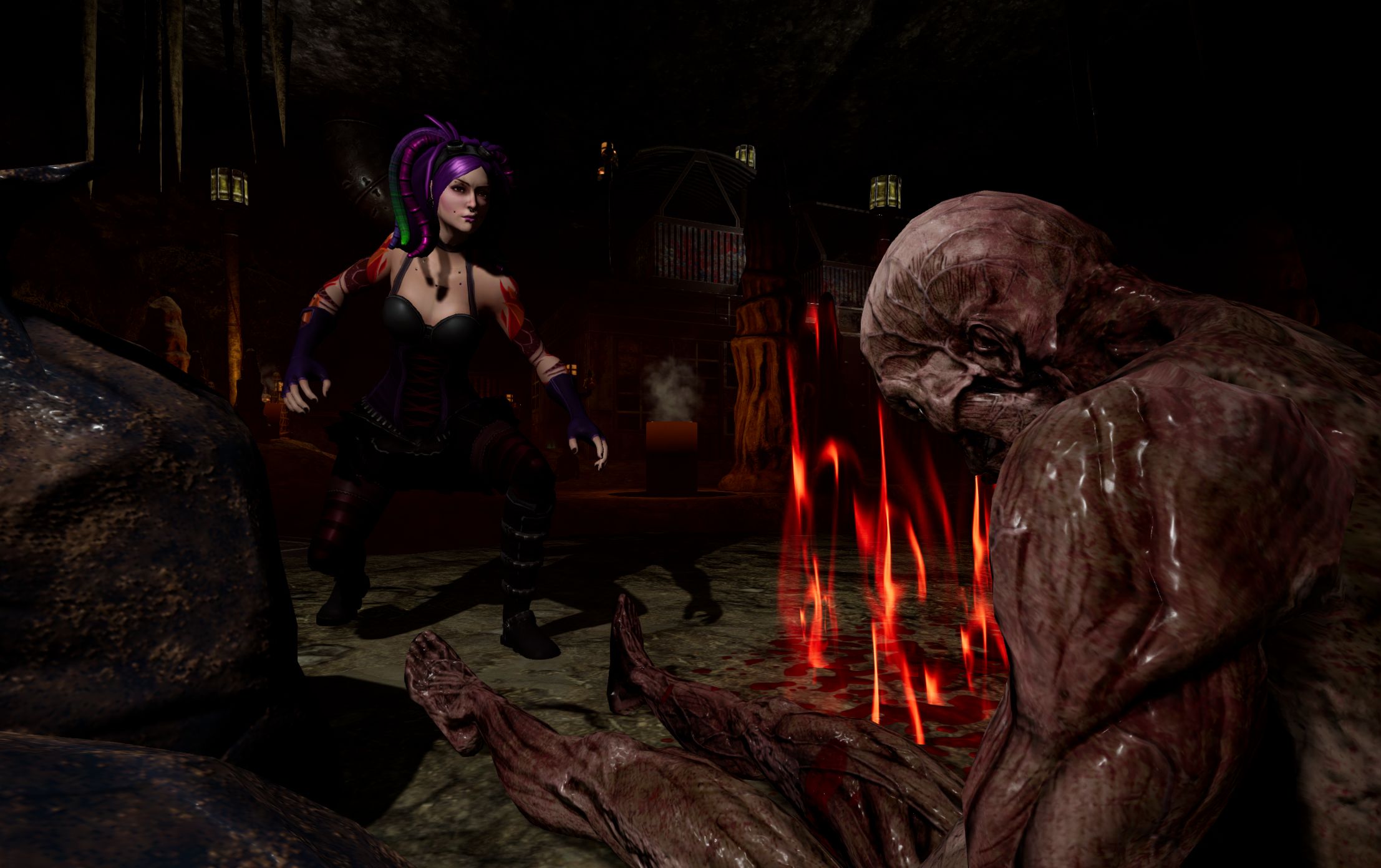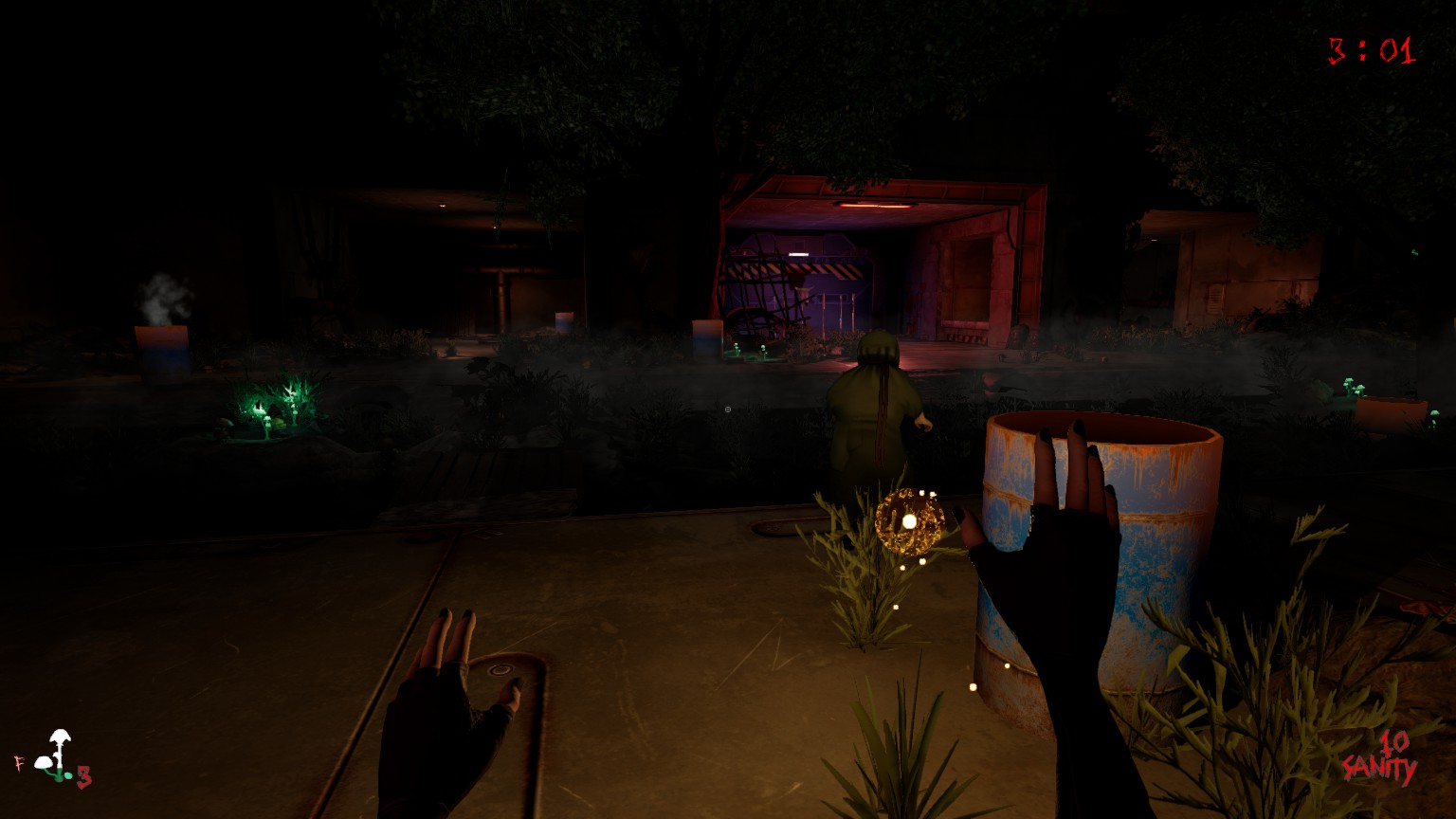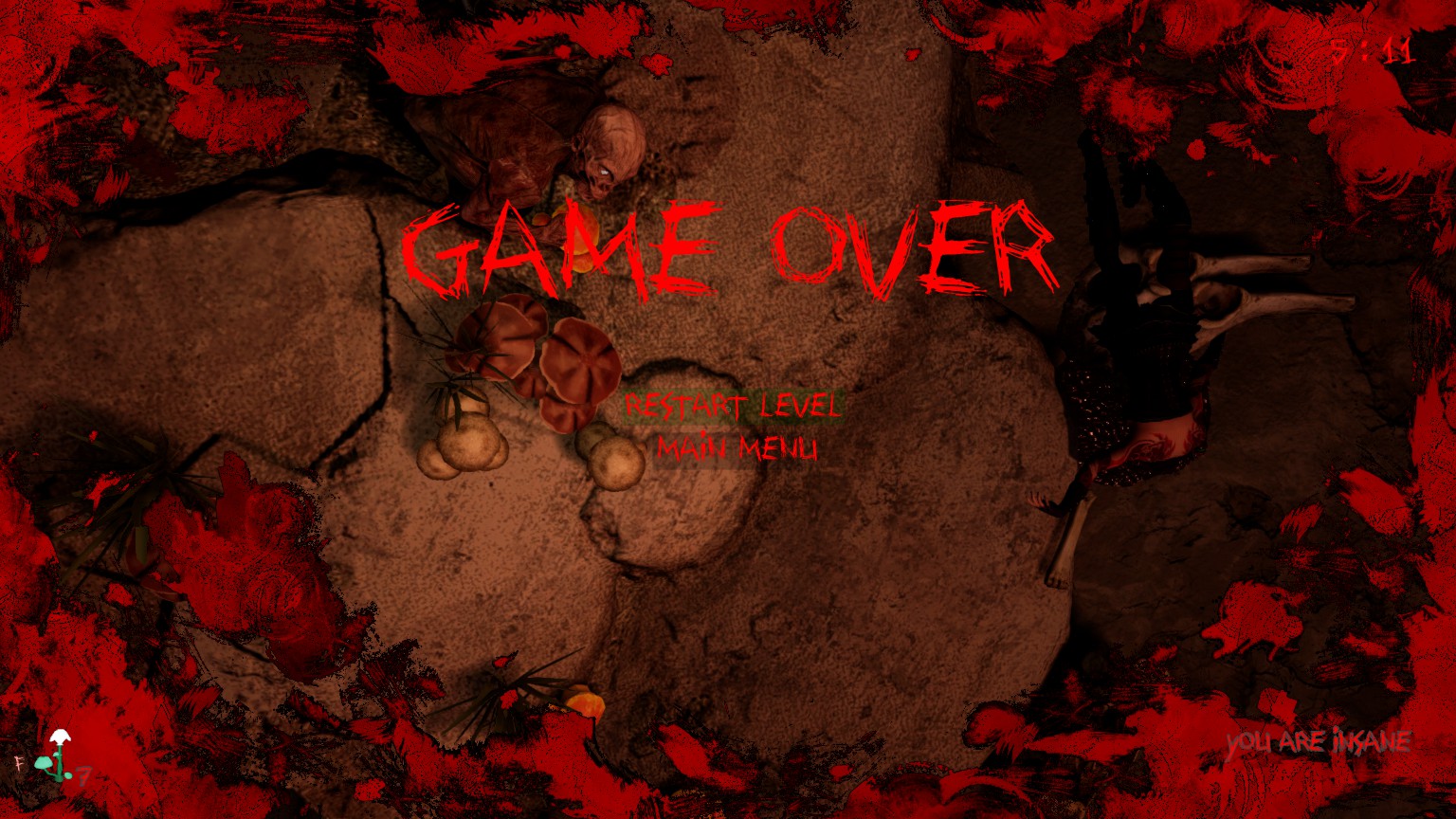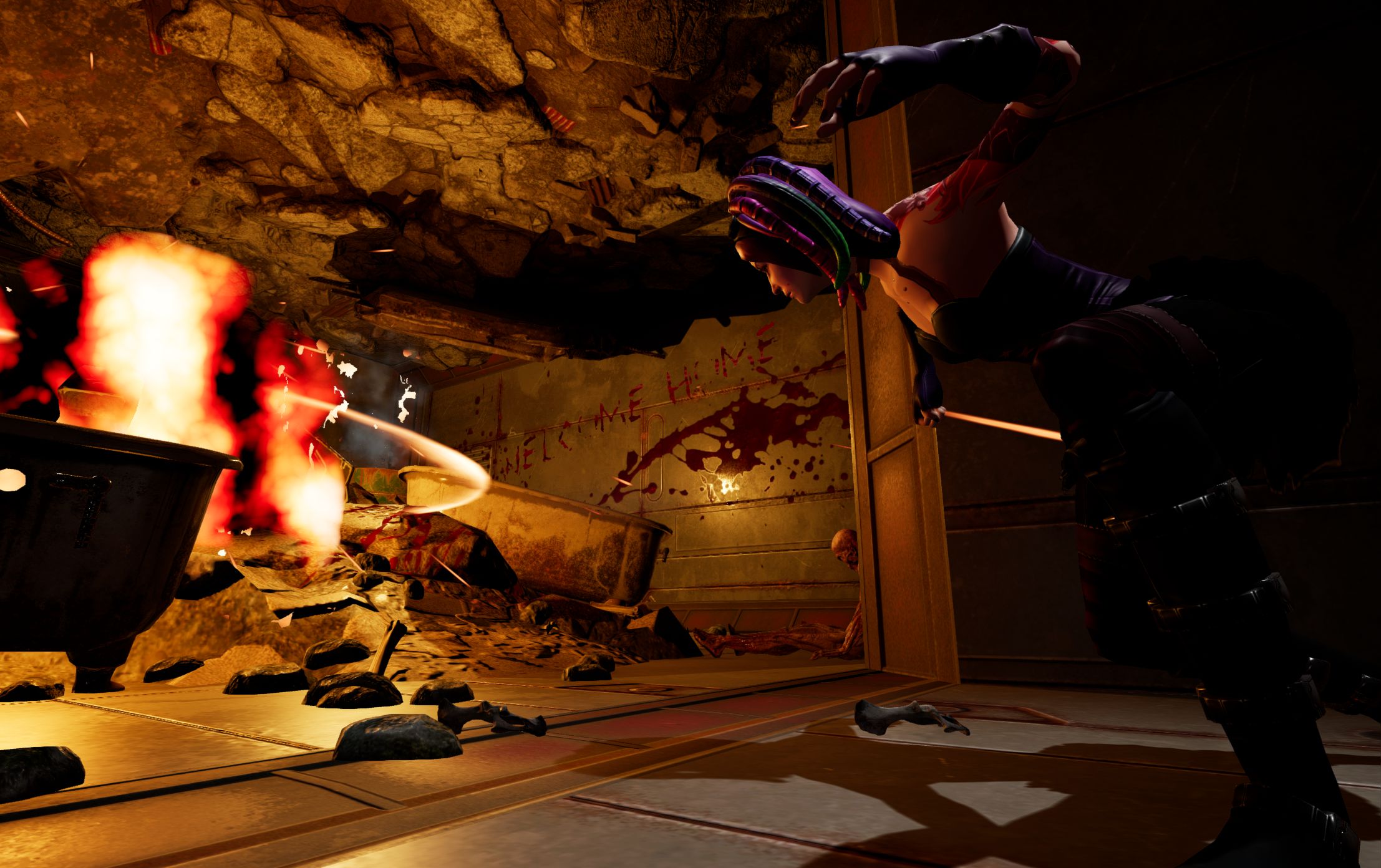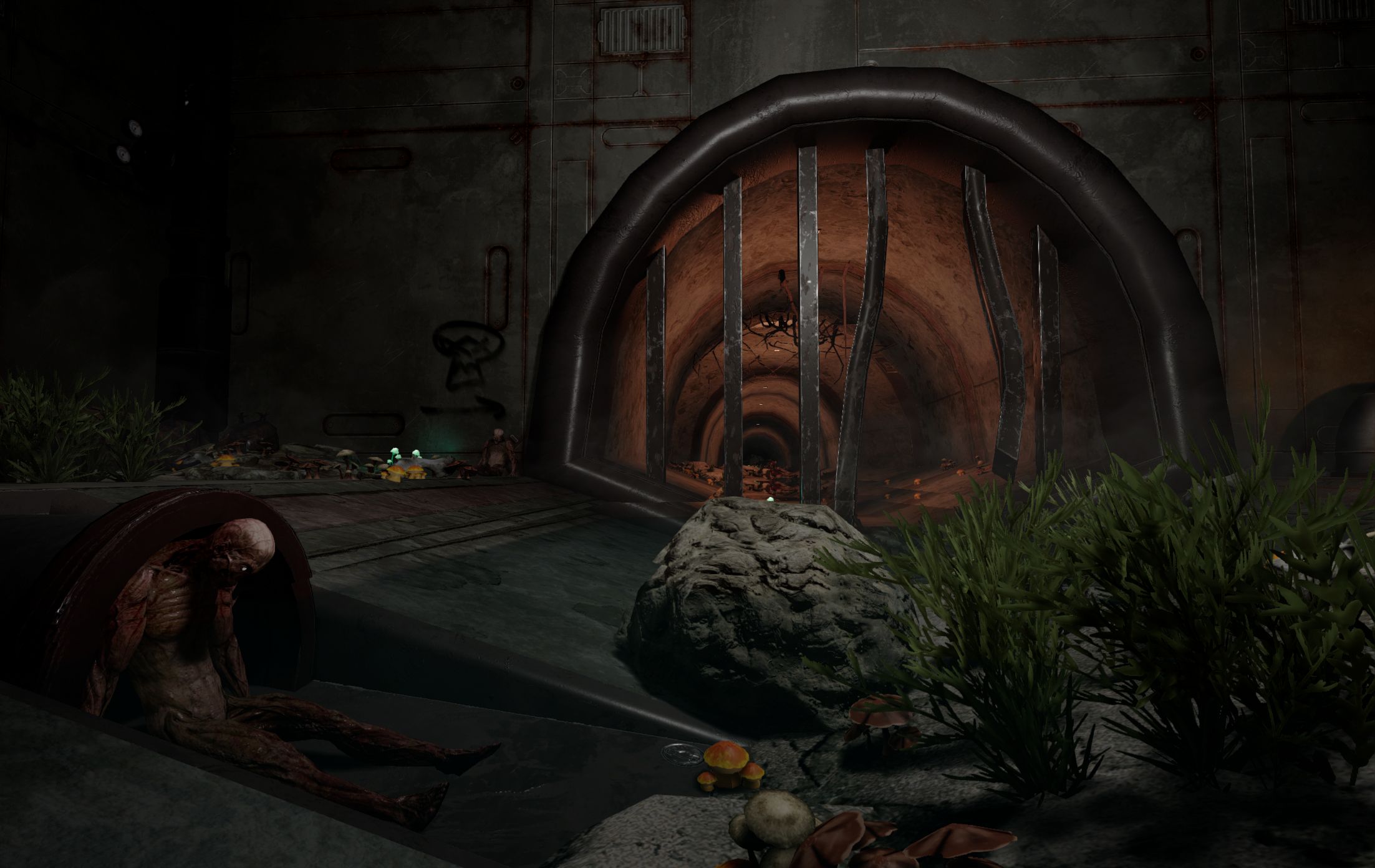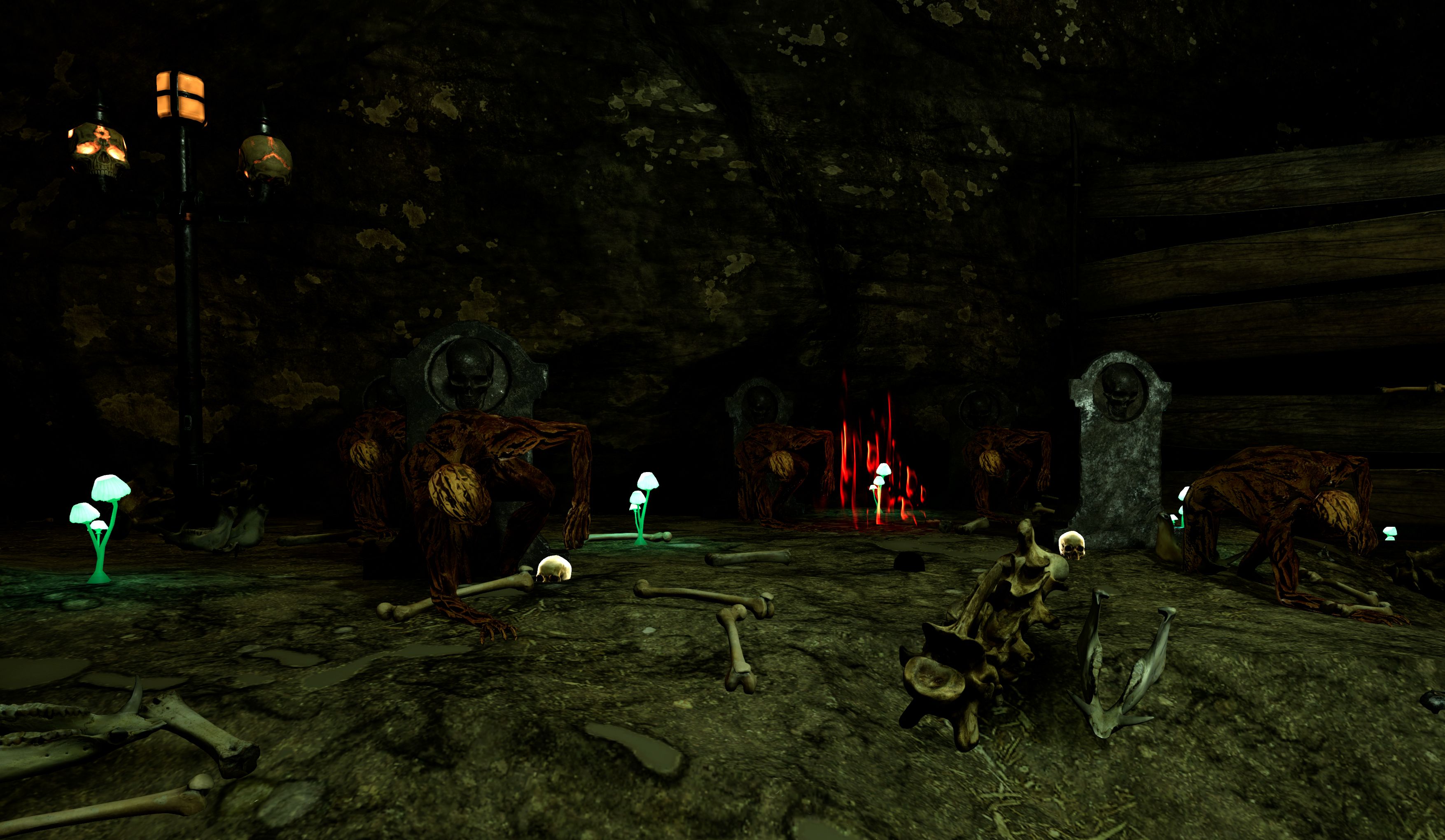Kaet Must Die! wants to be the game you love to hate the most
Jump scares! No manual saves! Exclamation marks!
Every time I play the demo of Kaet Must Die! it ends with me, Kaet, dying. Which I guess is truth in advertising. It's a first-person horror game that, from my limited perspective, is mostly about crawling through a sewer collecting glowing mushrooms when it is not about me, Kaet, being murdered. Sometimes I get approached by a creepy little Jawa-looking dude with glowing eyes who I scare off using my mushroom-powered psychic ability to summon balls of light, but mostly what happens is that a skinless jerk appears out of nowhere, grabs me, and drags me down into a GAME OVER screen.
Kaet Must Die! is a deliberately hard game, one that like Bennett Foddy's Getting Over It seems designed to hurt a certain kind of player. The story of how it ended up that way is an interesting one, but I'll let Scott Reschke, the CEO of indie studio Strength In Numbers, tell that.
PC Gamer: To get the obvious out of the way: why spell it "K A E T"?
Scott Reschke: Ha! Kaet is one of the characters from our first, unreleased, Early Access, game Tuebor: I Will Defend. Her full name is actually Kaetheran, but everyone at the studio kept shortening her name to Kaet, so it kind of just stuck.
How far back does the idea for Kaet Must Die! go?
The original concept for Kaet Must Die! was born out of frustration and chance. While working Tuebor, our studio's first title, our team was experimenting with livestreaming various kinds of games to see what interested folks the most. We noticed that viewers responded much more strongly when we streamed horror/puzzle games, as opposed to other popular PvP-focused titles, like Overwatch and Paladins. In fact, Alien: Isolation and the indie jump scare title Emily Wants to Play seemed to interest viewers the most.
It was quite surprising, and since we already had a full set of wonderful assets, characters, audio effects, particle effects, and whatnot on-hand from our work on Tuebor, we decided to greenlight a simple jump scare prototype for Kaet Must Die! Originally, this early build was just one level set in an underground sewer map from our first game.
It was around this time that I had found myself extremely frustrated with the industry. There were some major setbacks for our company throughout the course of development for Tuebor, so I had intended for Kaet Must Die! to be our studio’s swan-song farewell, with the idea that we'd make it as memorable as possible by making it as hard as possible to beat.
To our surprise, we started receiving an insane amount of positive feedback as a direct response to the game's difficulty. Players and streamers were also responding well to the game’s difficulty, calling it "the Dark Souls of jump scare."
What was supposed to be a single-level game that could be completed in a few hours, quickly wound up evolving into a much larger game with 10 levels that increase exponentially in difficulty. Players started asking for more story, more lore, more background on the game's mysterious setting—so we started ramping up production, adding more complex cutscenes and storytelling via cryptic notes and graffiti messages scrawled across the walls in each level. Traps, puzzles, and more cinematics also followed.
Before we knew it, what was originally designed to be an almost unfairly difficult jump scare puzzle game evolved into a more story-focused focused horror puzzle game. The jump scares are still there. However, they are no longer the prime focus of Kaet Must Die! As players progress, the game's story unfolds more and players will find out more about the creator of all the creatures, monsters, and tortured souls around every corner who are all trying to kill Kaet.
So talk me through the road to getting this game where it's at today. You submitted it to some big publishers but were rebuffed—what did they say?
Keep up to date with the most important stories and the best deals, as picked by the PC Gamer team.
Well, this game is technically the third game Strength in Numbers Studios is releasing. Our first game, Tuebor: I Will Defend, was intended to be the tent-pole title for our company. Tuebor is a third-person arena fighter with multiple PvP and co-op game modes. That is where it all started for us back in 2012. I tried doing everything the way I thought was best for an indie studio, and tried to be responsible in regards to our company's developers, investors, and most importantly, the players we wanted to enjoy our game.
I knew that indies often solicit developers to work for them for free in exchange for a "cut of the profits", however I also know how hard it is to make a living in this industry, especially if you are just starting out. As a result, I spent three years stumping for investment from various funds, incentives, Angel groups, VCs, etc. I was shut down by everyone given that there is no real flow of investment towards game development in this state [Michigan]. My luck turned around at the last minute when I got a private investor to put up the cash for the game (and a percentage ownership in the company).
Kaet Must Die! was initially my final flipping the bird to all things game development. I'd poured almost a decade of my life into this industry and company
Scott Reschke
I immediately started hiring developers from where I could find them (another problem in living in a state that doesn't have a flow of game development; there aren’t really many qualified devs). I started building the team and off we went to building the game. Ramp-up time was slow, but we were making progress. As soon as we had enough assets and demo pieces ready, we started sending out emails to publishers to try and get them on board. After fielding several calls with large and small publishers I was told "looks great, get back to us when you've got more finished product."
Two stress-filled years later, Tuebor was playing well, the major bugs ironed out, and we had small community of loyal fans who were telling everyone they could to come play with us. The sad part was that Overwatch, Battleborn, Paragon, Gigantic, PUBG, Paladins, had all come out in the meantime.
We had managed to get through Steam Greenlight (back when it was required to get votes) and I was using Steam Early Access in order to test and polish and pivot on the game according to player feedback (as I thought you were supposed to do in Early Access).
Sadly, the major launches of products in Early Access, often AAA games using the early access moniker to pre-sell units, has somewhat borked the system. If your game wasn't polished and ready to go, you get a heavy dose on negativity by the early player base, despite it being plainly labeled as "Alpha" or "Beta" or "Early Access".
We struggled to keep the community going amidst Overwatch and PUBG hype, and so I tried again to reach out to publishers. At this point I was told "looks great, but you should have come to us sooner because we need time to put our brand and spin on it."
The biggest publisher (a major global one) told me "it doesn't look indie enough" for their indie-branch (pointing to several highly stylized 2D sidescrollers), while the others said, "it doesn't look AAA enough."
Somehow, we managed to make Tuebor a game that was super fun to play, but that success was bittersweet following conflicting feedback from publishers that labeled it as "completely unknown," "too AAA for indie," "not AAA enough," "too early," and "too late," all at the same time.
Which led to your decision to make a game that's unforgiving as possible. I'm imagining that bit from The Simpsons where Homer explains his reason for wanting to be a Bigger Brother is "spite".
Oh yes. Kaet Must Die! was initially my final flipping the bird to all things game development. I'd poured almost a decade of my life into this industry and company, and thought I did things the right way (actual salaries for the devs, health insurance, flexible hours, going Early Access instead of releasing a bug-filled Gold release), but rejection and conflicting feedback from talks with publishers was the last straw. I hate to admit it, but the salt was strong in me.
So we channeled that frustration and moved full speed ahead with Kaet Must Die!, aiming to make an arguably unfairly difficult game nobody could beat. The real amusing part is that this challenge in-and-of-itself could be the very thing that saves this company and allows our studio to move forward.
I've been told that it feels more like "old school" gaming from so many random people who keep trying for hours at a time to beat even the easiest level.
In recent years we've seen a lot of games that advertise extreme difficulty doing well for themselves. Is making Kaet Must Die! more punishing not actually quite a crowd-pleasing move?
I had started making Kaet Must Die! before seeing the likes of Cuphead come out, but am thrilled with seeing that it is a viable genre. In terms of design, Kaet Must Die! is more inspired by player reactions to Dark Souls, Alien: Isolation, and games such as that. If players consider Kaet Must Die! in their personal list of games they loved to hate the most, we'll be very pleased.
Kaet Must Die! will be available on April 5. You can download the demo on Steam.

Jody's first computer was a Commodore 64, so he remembers having to use a code wheel to play Pool of Radiance. A former music journalist who interviewed everyone from Giorgio Moroder to Trent Reznor, Jody also co-hosted Australia's first radio show about videogames, Zed Games. He's written for Rock Paper Shotgun, The Big Issue, GamesRadar, Zam, Glixel, Five Out of Ten Magazine, and Playboy.com, whose cheques with the bunny logo made for fun conversations at the bank. Jody's first article for PC Gamer was about the audio of Alien Isolation, published in 2015, and since then he's written about why Silent Hill belongs on PC, why Recettear: An Item Shop's Tale is the best fantasy shopkeeper tycoon game, and how weird Lost Ark can get. Jody edited PC Gamer Indie from 2017 to 2018, and he eventually lived up to his promise to play every Warhammer videogame.
